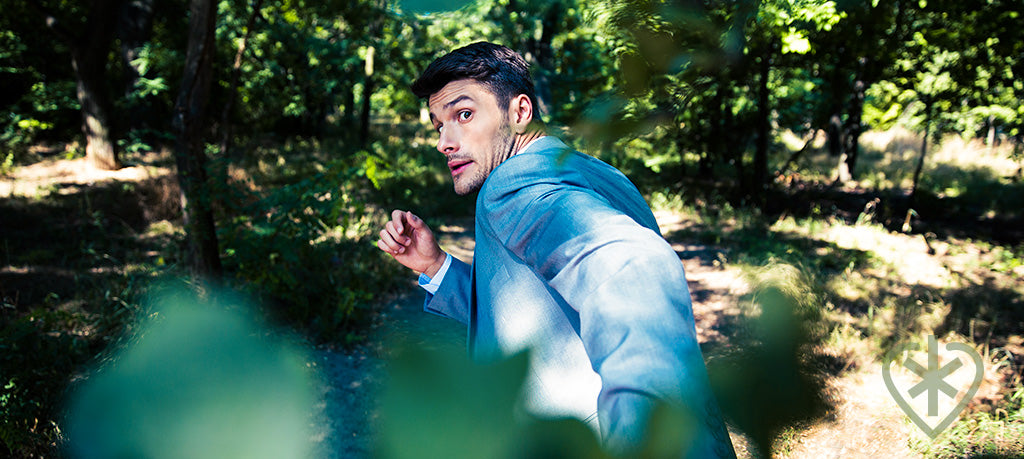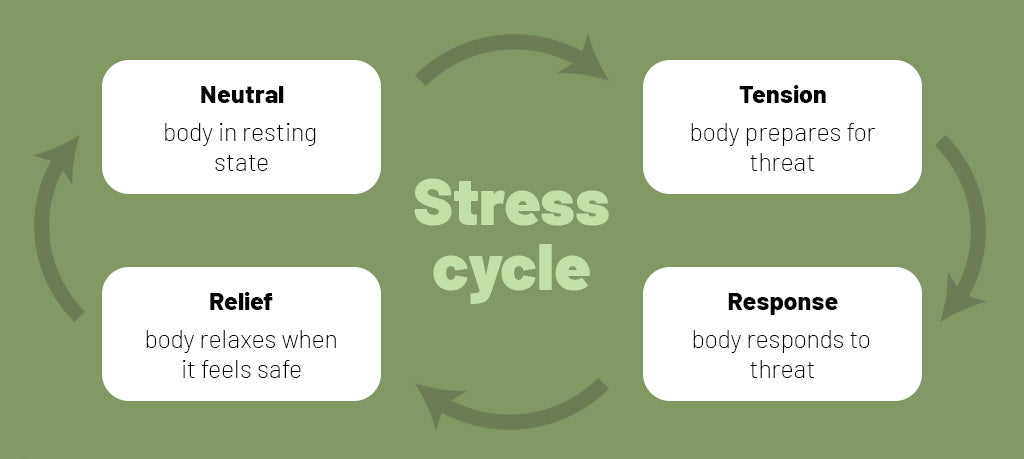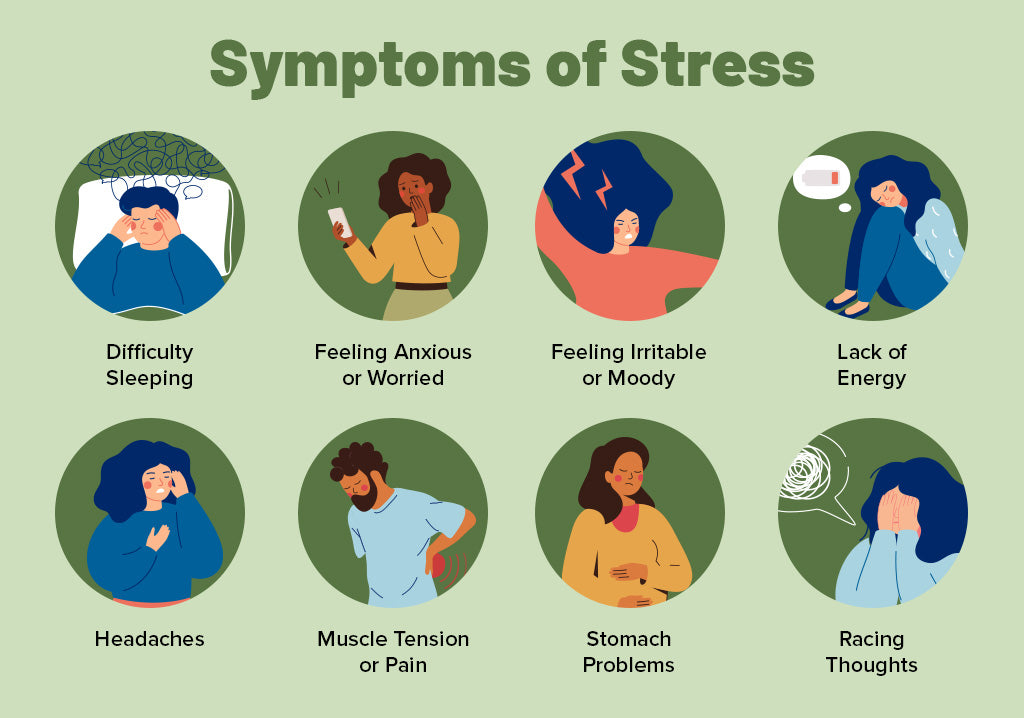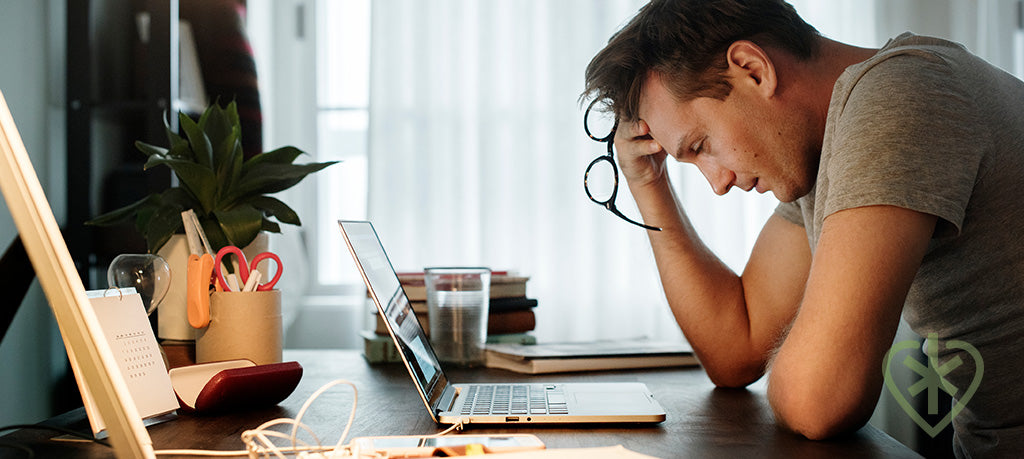Since 1992, Stress Awareness Month has been held every year in April, in order to inform the public of both the causes and solutions to the modern-day “stress epidemic”. And the first steps we can take are to understand what stress is, what effects it has, what causes it and, most importantly, what we can do about it.
What Is Stress?
Stress is the body’s tensing reaction to an external pressure or difficult situation. It’s a natural response meant to help us react quickly to external challenges and threats and to keep us safe. A built-in defence mechanism evolved to save us from immediate harm, but which can go awry when engaged for long periods of time.

Everyone gets stressed sometimes, and that’s not inherently a bad thing. The problem, as with anything in life, is how much and how often it happens.
How Can Stress Be Good?
You’re leisurely crossing an empty street, when you hear a car around the corner, braking with a screech as it approaches you. Before you’ve even seen it properly, your brain is suddenly more alert and time seems to slow down. Your heart races, your muscles tense and your breath becomes shallow. You leap out of the car’s way with a speed you didn’t even know you had. A passer-by asks if you’re OK and you share your experience with them, or you call a friend to tell them about it. You laugh, you cry, you shake it off. You return to normal, even if it takes a while.
This was an acute stress response, sudden and fast-acting. Your body prepared through a quick stress hormone surge of adrenaline and cortisol. Your brain and muscles tensed, your heart pumping them full of glucose and oxygen. Every other process and system in your body was de-prioritised as you dealt with the threat.
The stages you just went through – rest, tension, response, relief – comprise a full stress cycle.Thanks to the stress response, you survived the threat and can now enjoy the rest of your day. This is what our ancestors prepared us for, back in their ancient jungles: see a tiger, fight it or run to safety, relax and rejoice with our tribe once it’s gone.

How Can Stress Be Bad?
Chronic stress is the flipside of the survival coin. In our modern world of constant communication about conflict, violence, abuse, illness, destitution and other threats, it often feels like we can’t fully relax. The “tiger” is never really gone. The stress cycle gets stuck in the tension stage.Our bodies cannot cope with this constant alert. Sooner or later, it leads to burnout and a host of health problems, from heart disease to headaches, joint pain, ulcers, skin and hair problems, memory loss, bad moods and poor sleep. (The list is longer, but there’s no need to stress you out even more!)
What Does Stress Feel Like?

Some of these underlying health problems may stay “silent” until we recognise the outward signs. We may feel several of these physical and psychological symptoms over a longer period:
- Difficulty concentrating, memory problems, trouble making decisions;
- Feeling anxious, worried, hopeless, scared;
- Feeling irritable, aggressive, frustrated; having mood swings and racing thoughts;
- Losing our sense of humour, enjoying our favourite activities and people less and starting to avoid them; feeling depressed;
- Having frequent headaches, backaches, muscle tension and pain, feeling our heartbeat increase;
- Having digestion issues, stomach pains, acid reflux; loss or increase of appetite;
- An onset of skin reactions, acne, stress rashes, even some hair loss;
- Trouble sleeping, feeling tired and exhausted even when we do sleep.
What Causes Stress?
Here is the last bit of bad news in this article: our brains don’t naturally know how to distinguish between the immediate threat of a pouncing lion in the savannah and the more vague threat of noisy traffic at the office. Stress can be triggered by both the known (the school bully is threatening to punch me) and the unknown (I’m moving to a new city). We can feel stressed about immediate and certain issues (I’m going into labour) or distant and uncertain ones (more people are being made redundant in my industry lately).

Difficult, intense or sudden life events and changes, health issues, increased pressure at home, at work or at school can all lead to us feeling stressed. These can include things that happen to us or to those we care about the most. And some factors can increase the likelihood of us getting stuck in the stress cycle: hormone imbalances, sleep deprivation, poor nutrition and lack of exercise.
But let’s move on to the good news – there are ways to fight back!
Stress Management
Managing stress seems like it should be simple, right? Get rid of the cause of stress and everything will be fine. Whenever we can, of course, going straight for the source of the problem is ideal. We can remove a patch of mould on the wall that was triggering our allergies. We can move away from a noisy, polluted city to a quiet town, close to nature.
While that may work in some situations, we live in a society where removing all possible sources of stress is simply an unrealistic goal. The answer then becomes: we adapt our response to stress so we can better cope with it.
Completing the Stress Cycle
As Drs Emily and Amelia Nagoski explain in their best-selling book, Burnout: The Secret to Solving the Stress Cycle, “dealing with your stress is a separate process from dealing with the things that cause your stress. To deal with your stress, you have to complete the cycle.”
For our tiger-plagued ancestors, this meant releasing the pent-up energy during the fight with or flight from their predator, then reaching the safety of their tribe and celebrating together. While we may be forced nowadays to face other kinds of “tigers”, the basic principles are the same: expending energy and feeling safe completes the cycle. The main ways the Nagoskis suggest we do that are:
- - Expending our energy through physical exercise – from walking to sports, whatever gets us moving for 20-60 minutes a day will do the trick.
- - Practicing breathwork. We counteract the quick, shallow stress-breathing with deep and slow breaths that we can feel in the belly.
- - Releasing pent-up mental energy through crying (like there’s no-one watching), through deep belly-laughs or through creative expression (like it doesn’t even matter if anyone’s watching).
- - Finding reassurance in community – whether that of people, pets or the spiritual kind – and in expressing affection with a safe person we trust and respect.
Recent research also supports this approach, under the newly-studied "science of awe". Essentially, all of the above actions can trigger in us a sense of awe and wonder, which has been shown to reduce stress.

Bonus: Self-Care and Healthy Habits
Apart from all of the above techniques, it helps to keep in mind that the way we care for our bodies matters. Healthy habits can protect us from suffering even worse effects of stress. And, much to the chagrin of procrastinators everywhere, standard health advice is standard for a reason: it works!
- Keep a healthy diet. Get your daily intake of fresh fruit and vegetables and try to cut back on processed foods. Extracting the necessary energy from highly processed foods requires extra steps from your digestive system. If its function is already impeded by cortisol, having it work harder will only make you feel more tired and feed the stress cycle. So keep it simple and fresh.
- Keep moving. We’ve already said it and you hear it everywhere, but it really is that important. If you can, getting out in nature will yield the best outcome – you’re getting exercise, plenty of fresh air, and focusing on distant scenery will help your eyes and brain relax. If it’s a team or social sport or event, you’re also reaping the benefits of socialising!
- Sleep. It’s even harder when stress is disrupting it, but sleep is crucial for optimal brain function, so try and improve yours. Stick to a sleep routine, avoid caffeine and alcohol before bed, leave your brightly lit screens outside the bedroom. (See if our Sleep Support CBD Oil with camomile and lemon balm helps.)
-
Relax. Since stress is all about tension, any activity that releases it will help. Meditation, yoga and tai chi are techniques that can help you calm down and increase the levels of oxytocin, the social bonding and happiness hormone. Taking a long bath, having a massage or getting pampered at home or at a spa can have a similar effect.
For busier brains, hobbies are a great alternative of keeping your brain engaged in a low-stress activity, with the added benefit of activating the production of dopamine, the other happiness hormone. From gardening to building miniatures, whatever gets your brain pleasantly busy but not overworked will do the trick.

So, What Have We Learned about Stress?
That was quite the journey, wasn’t it? But we are now better equipped to deal with stress.
- - We know it’s a normal response to perceived threats, meant to keep us safe. We all feel it throughout our lives.
- - We know too much of it makes us sick and impedes our brain function over time, due to how stress hormones affect the body long-term. We can’t keep our bodies going at full throttle for too long.
- - We know we can counteract its negative effects by completing the stress cycle. We can try a combination of exercise, breathwork, laughter, crying, creative expression and finding solace within our community and with our loved ones.
- - We know that diet, sleep, movement, relaxation and human connection all play big roles in keeping us going through times of stress.
The theme of this year’s Stress Awareness Month is #LittleByLittle. As the name suggests, it’s about how even small changes can add up to having a positive effect on our well-being. One little step you’ve already taken is understanding stress a bit better. The next step, however small but always significant, is yours to take today.
If you're still unsure of how completing the stress cycle could look for you, we've put together a few handy tips on how to get started with going out in nature, with caring for your skin and with doing breathwork.














Leave a comment
All comments are moderated before being published.
This site is protected by hCaptcha and the hCaptcha Privacy Policy and Terms of Service apply.